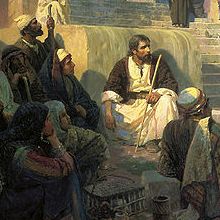What Yeshua Quoted
The commentaries, notably the Mishnah which later became the Talmud, were not written in Greek. Study of the Word was done in Hebrew, and the commentaries reflect that. They would not work in Greek and make commentary in Hebrew. Yes it could happen, but it seems very counter intuitive.
 Certainly, extra-biblical texts such as the books of Maccabees may have originated in Greek. I’ve read that no Hebrew text of the story of Hanukkah existed until the 18th Century, when it was translated from the Greek. Yet the story of Matthias and Judas Maccabee was well-known, observed in the temple in Jerusalem (John 10:22), and likely known in Greek.
Certainly, extra-biblical texts such as the books of Maccabees may have originated in Greek. I’ve read that no Hebrew text of the story of Hanukkah existed until the 18th Century, when it was translated from the Greek. Yet the story of Matthias and Judas Maccabee was well-known, observed in the temple in Jerusalem (John 10:22), and likely known in Greek.
Now, did Yeshua quote from the LXX? Maybe. Yeshua demonstrates time and again a great propensity for speaking to his audience effectively. Would he quote the Septuagint to the Pharisees? I very much doubt it unless he intended to provoke them. I prefer to think that he would let the truth of the Word of God be the stumbling block and not his use of Greek.
In Matthew 22:35 we are told that Yeshua was asked by an “expert in the law.” Would Jesus reply to such an educated individual in the vulgar (i.e. common)? Maybe. But remember, his reply incorporates part of the Sh’ma, the holiest prayer of Israel both then and today. Given to whom he was speaking and the content quoted, it seems more reasonable that he would reply in Hebrew. A good speaker and a good teacher is always concerned with who is audience is and how best to communicate with them.
At other times, such as when he would address the multitudes, likely a mix of Hebrew and non-Hebrew speakers, who knows? He may very well have spoke in the regionally common Aramaic (as he used on the cross-Mark 27:46). Or, if there were God-fearing gentiles and Hellenized folk in his crowd, it seems reasonable to assume that he would use Greek.
I don’t think anyone can say with any measure of certainty what language or languages Yeshua used when quoting the Scripture. Neither do I think it relevant. Communicating the message in the best way, with as few hindrances to the audience as possible, would have been paramount. If that required Aramaic, Greek, Hebrew, or Latin, I believe it is likely that the Living Word would make it accessible to his hearers.
Category: Biblical Studies, Winter 2015


